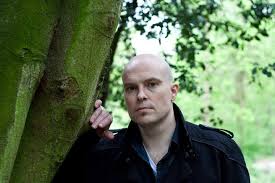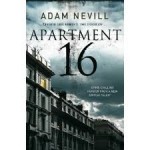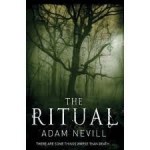 British writer Adam LG Nevill has garnered praise for his visceral yet nuanced horror stories, as well as comments such as “The next Stephen King”.
British writer Adam LG Nevill has garnered praise for his visceral yet nuanced horror stories, as well as comments such as “The next Stephen King”.
So, not too shabby.
I recently read The Ritual, which not only reinforced all my prejudices against camping, but also impressed me with its finely imaged moments and subtle details that made everything so very real and believable. The hooves – THE HOOVES!!!! Read the book.
Adam kindly agreed to answer some questions about his writing, not desensitising the reader, his influences, steaming piles of first drafts. I may have promised him a pint at WFC.
So first things first: how did you start out? What made you want to write?
I started out writing music and sports reviews for newspapers and magazines, then wrote erotica; both short stories and novels. That’s how I cut my teeth; in the same period as writing one erotica novel each year, I wrote my first horror novel, Banquet for the Damned and the first part of what was to become Apartment 16. I took baby steps; wrote reviews about things I was interested in. Could I get them published? Yes. Then I wrote fiction that didn’t require huge amounts of research; to practice all the facets of narrative as much as anything else. Having erotica novels published gave me the belief that I could get the novels I was born to write published.
What made me want to write? My Dad reading to me was the start of the process, then me becoming besotted with books as I grew older. So being transported by books and stories and films at an impressionable age refined what was a formless though innate creative urge. What really refined writing as a purpose for life was my English Literature A Levels (you take these aged 16 – 18) and reading Portrait of the Artist as a Young Man. That book made such an impression on me and also made me realise that I’d be dissatisfied, miserable and angry unless I wrote fiction. I then read a great many outsider classics and they all further augmented my compulsion to write. By this time I’d also realised that I could not paint and was musically inept, and that I was a born daydreamer, but average at most everything else. If you are a daydreamer and your school reports cite “Adam spends most of the day gazing out of the window with his mouth open” what can you do with your life? You have to find a meaningful means of expressing those daydreams or you’ll end up frustrated and miserable; I knew this when I was still a kid. After school, I went to university twice to study English and purely to help me become a writer. In fact, I can honestly say, that almost every significant decision I have made since leaving school was made to help me become a writer (and these were often bad decisions).
What was the inspiration for Last Days?
An interest in the counter culture of the sixties, a morbid fascination with ordinary sociopaths who operate in micro cultures, medieval history, good true crime books, found footage horror films, guerrilla film making … a whole host of things. It was one of those books written at a time when an array of personal interests and reading formed a critical mass and gave me a story. Two of the novels that made me want to write popular novels in the first place, and novels with a big twist/reveal, were The Black Dahlia by James Ellroy and Falling Angel by William Hjortsberg. Last Days was my attempt to try and emulate what I loved about those novels.
Are you a big plotter and planner, or are you a talented, by-the-seat-of-the-pants writer whose work just rolls out perfectly (which means the rest of us must kill you)? 
It varies. Last Days was plotted in advance, with each scene researched before I began writing the scene. It was like a military operation. Lack of preparation on that novel would have resulted in failure. It was my first horror novel written to a deadline, and also my longest and most ambitious story – four hundred years of complicated history told through participants in an eleven day film shoot, a true crime story, and a film that it would have been possible to make on that equipment in that time frame.
The first three novels were written without a publisher or deadline, but were fortunate enough to be eventually published. But Last Days was the first novel I was able to work on nearly every day for a year, and not in fits and starts and Sunday afternoons over two to four years. But all of my books have been written in a combination of planning, deep thinking, research, and just being in the zone and letting the story take over. They have all ended in ways I did not envisage. If I create the world and it feels authentic to me, and then the characters begin to talk of their own volition, I am not entirely responsible for what happens …
Was The Ritual based on a real-life experience that had you wondering ‘what if’ afterwards?
The specific scenes at the beginning of the novel, though not the characters, were inspired by a disastrous camping trip that I was involved in nearly twenty years before I wrote the book (it can take me that long to find a story for something): this was a long weekend expedition that ended in a party of fools trying to find somewhere to pitch a tent in the snow, in a wood so hideous we were convinced it was evil, inside which we also found two dead sheep hanging from the trees. So yes, I wondered about those sheep for years; when The Ritual came out, someone told me farmer’s use poisoned sheep carcasses as crow bait, so the mystery was sadly dispelled. But not before I wrote the book! And also, why was there an old car in a tree too? That I cannot explain, but it was a surreal and haunting experience and felt, at the time, like a macabre reminder that great powers exist of which we know almost nothing.
 Which do you prefer: writing the first draft or doing the editing afterwards to make it shiny?
Which do you prefer: writing the first draft or doing the editing afterwards to make it shiny?
I write multiple drafts with a break in between each draft. Eventually, I’m just done. Though, in the style of Henry James, I have now realised how much I would like to go back into every new edition of my books and revise some parts again. I am an obsessive compulsive rewriter and would never kid myself that anything is ever perfect or finished.
There’s something very old school and classic about your style – who were your influences and writing heroes early on? Has that changed as you’ve gotten older and written more? Whose work do you love to read?
M R James. My Dad read his ghost stories to me when I was a boy, I listened to the stories read by Michael Hordern, I watched adaptations on television … he is my primary influence and the main reason why I write horror fiction. Arthur Machen, Algernon Blackwood, Walter De La Mare, Oliver Onions, L P Hartley, H R Wakefield, Edith Wharton, Shirley Jackson, Robert Aickman: the list of my influences from the canon of horror is broad. Lovecraft was the writer of my mid-teens too.
I’ve also focussed on the horror novel, and not the short story, and quite a few of the contemporary horror writers who brought horror into the modern age were key influences: Stephen King (someone else I read a great deal of in my teens), William Peter Blatty, Dan Simmons, Peter Straub, Clive Barker. Barker particularly was such a game changer for so many of us; both in the quality of his writing and the extraordinary imaginative power of his work. Thomas Ligotti and Ramsey Campbell will always be influences and great examples of the kind of ideas, effects and literary quality that can be achieved in the field. As are Joel Lane and M John Harrison.
I also read a lot of non-fiction, and didn’t read much, if any, horror for ten years when I mostly read post-modern literary fiction. That was in my twenties. Writers like Cormac McCarthy, Ian McEwan, John Cheever, also made me think about writing horror in different ways.
But what I always find time to read are those writers with a distinctive creative vision who combine a sophisticated literary style with genre fiction. Recently I have been very impressed with Richard Gavin, Laird Baron, John Langan, and Matt Cardin, who all possess this rare quality in abundance, and I still have a whole host of new horror writers to read.
There are so many average, derivative, flat and unimaginative novels being published all the time; even so, there are so many terrific novels and collections out there that I will never have the time to read, or to even find out about. One of the true horrors of mortality.
What attracts you to supernatural horror rather than pure slash-hack-meat-cleaver-and-hockey-mask horror? 
There’s no either/or for me, Angela. I’ve come to realise that I now write what is required by the actual story on a case by case basis. A more subtle and enigmatic approach to the supernatural and occult has suited the best part of most of the stories I have written thus far. But then I never anticipated I’d write some of the scenes in The Ritual or House of Small Shadows, or my new novel-in-progress, which all include very violent and gruesome scenes; but these scenes were a necessary part of their respective stories.
As a stylistic choice in Banquet for the Damned, I deliberately tried to avoid anything but a suggestive handling of the uncanny or violence (but there is an undercurrent, and one explicit scene, of ritualistic cannibalism, although I don’t think I use the word “blood” in the entire book). By the time I was writing Apartment 16, I realised that depictions of the human grotesque were as much a part of my aesthetic as subtlety is – the grotesque is probably more affecting than gore too, but it is still a bedfellow of gore.
If there is violence and gore in my fiction, then it has to be needed by the story, be part of that story’s horror, and it has to matter, make sense, and be realistic – the prelude, the act, the aftermath. So I don’t avoid violence or gore, but only include these things when and where they are necessary. Such things have their place; used appropriately and not gratuitously, they can raise the stakes in a story tremendously by amplifying danger and consequences, and increase a reader’s investment. Shakespeare’s King Lear is probably the best example of this collusion.
Inciting revulsion in parts of a story is also fine by me; it is a necessary part of extreme situations and the extreme reactions they cause; it has legitimacy and I do toy with repulsion. But using body counts and hoping to create revulsion in a reader are not primary artistic aims of mine for the duration of entire novels, or for a reader’s single enduring memory of a novel.
What I try to avoid at all costs is silliness and overwriting. Supernatural horror, perhaps more than any other genre, constantly courts the ridiculous. Much of the horror, in all mediums, that contrives to be sick as a creative aim, is ultimately silly to me. There is nothing silly about real violence or bloodshed; I’d hate to desensitise a reader to it. In fact, I’d hope to remind a reader that it’s best to avoid such things.
Ultimately, what counts is not what you write about. What’s more important is how you write about, or treat, your subject matter.
I don’t write books of purely psychological horror either; my novels do often run red with awful things. Some things so awful it’s best to only allude and suggest them, not to writhe in them with your eyes open. I trust my instincts on this.
 The House of Small Shadows is your next novel. So, dolls and puppets – cute toys and entertainment or little abysses we tell children to pour love into? And what makes them so inherently creepy?
The House of Small Shadows is your next novel. So, dolls and puppets – cute toys and entertainment or little abysses we tell children to pour love into? And what makes them so inherently creepy?
I’m only really interested in those dolls and puppets that issue a grotesque quality all on their own, and that may have been unintended at the time of their creation, or it has grown as a consequence of aging; those artefacts that possess a character that suggests a hidden life; a life unlike ours, but a sentience all the same, that we seemed particularly attuned to as children. It’s their imagined life in our early years that I wanted to write about. Took a long time for me to justify a novel-length story for that interest too.
Of all your novels, which is your favourite? Which one would you recommend to someone who hadn’t really anything of yours yet?
I honestly don’t have a favourite, but as a recommendation, probably The Ritual, because it would suit any reader; those whose primary interest is story, pace, action, etc.; but I don’t think the book neglects those who hunger for the strange and the enigmatic.
It’s a novel I imagined cinematically, and I believe there is even a script inside it, and I deliberately tried to write the novel in a modern “thriller” idiom (to see if I could write beyond the more baroque and lyrical style that I’d developed in the first two books). I also wanted to write a book that might in some small way counter male sub-literacy, which is a major time bomb in the Western world, by writing an action adventure horror story about men that I could imagine young men, who don’t read, enjoying if they did read the book. But given all that, I realised within a few pages, that if the story was not also capable of transporting me as a piece of weird fiction – with Lovecraft’s yardstick of awe and wonder – then I would lose interest in writing the book. I tend to find that purely plot-based fiction is unimaginative. So I tried to combine both approaches within the same book; whether it worked, I’ve since realised, is down to individual readers.
What’s next for Adam Nevill? 
No One Gets Out Alive. That’s the title of the work in progress. I’d like to talk about it all day, but the book is far from finished and talking about unfinished work, for me, is too close to assuming that I’ve done the work (or that it’s any good; sadly, there’s still plenty of time for it to steam like fresh dung).

